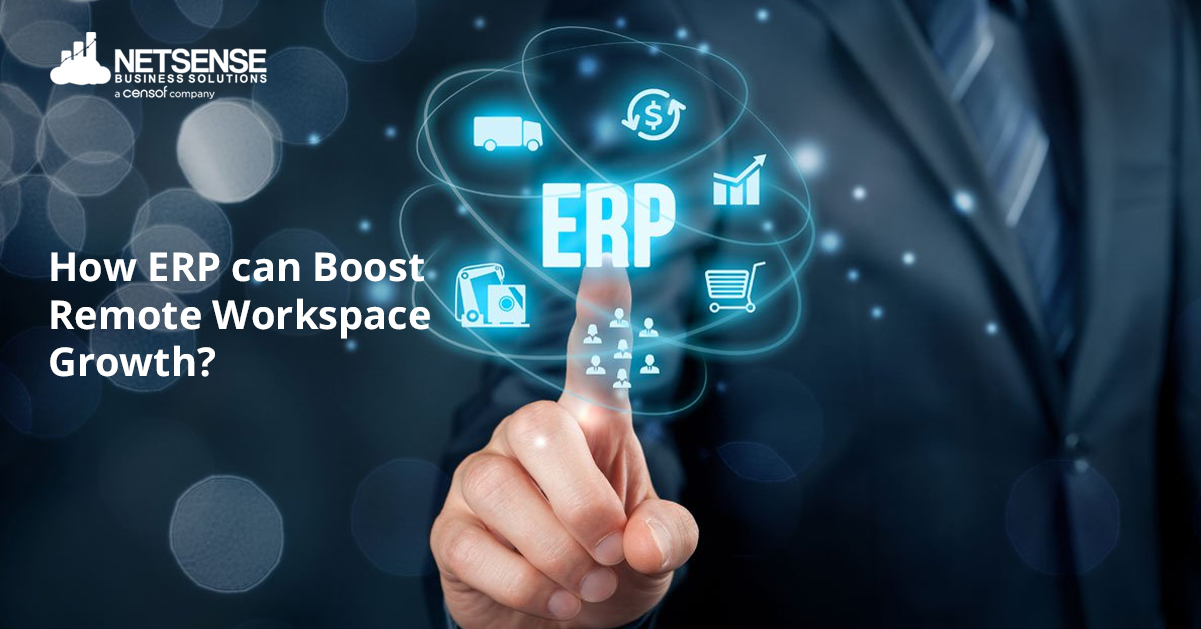With the coronavirus pandemic reeling all over the world, a shutdown has resulted and now many companies have adopted a remote work ecosystem to flatten the curve and ensure the safety of their workforce. While telecommuting has been around for years among certain U.S. workers, companies still lack a reliable remote work program that leads to communication breakdown, reporting delays, a decline in productivity, more cybersecurity risks, and much more.
In order to ensure that your team members work productively from home, it is necessary to establish clear guidelines that must include daily working hours, task submission process, task updates, and so on. A cloud-based ERP (Enterprise Resource Planning) system can greatly help to facilitate all processes and departments within your company, including finance, sales, production, distribution, customer relations, and even HR departments from anywhere, anytime.
ERP system ensures comprehensive work-from-home management that allows teams to work cohesively, even when they aren’t in a traditional office environment. For a completely distributed workforce, we’d like to share a few tips to help companies enhance the functionality of ERP in a remote environment.
- Empower Remote Work and Efficiency
It is essential to ensure that everything from remote-work technologies to workflows and training should be in place. Up-to-date remote-work guidelines will help to improve workforce productivity and business continuity. In order to preserve efficiency, businesses should collaborate with internal and external resources within ERP software and then, train the workforce on new processes and security protocols. - Choose Cloud-based ERP Over On-Premise Systems
It is vital that key employees should be able to access ERP software via a web-based portal or VPN while making sure configurations for remote work be up to date and tested. Always opt for cloud-based ERP rather than the on-premise system as they are designed to work remotely, also provide immediate scalability and flexibility for potential business needs. - Automate Business Processes
Organisations should focus on automating manual business practices and workflows to enhance operational productivity in a remote work environment. Say ‘Goodbye’ to the scattered manual spreadsheets and go for ERP solution powered with Artificial Intelligence (AI) to automate multiple workflows such as order, invoice processing, reporting, shipping, warehouse operations, and forecasting. - Anticipate Fluctuations in Accounting and Financial Filings
Due to the devastating economic effect of COVID-19, companies need to prepare themselves for new accounting rules, balance sheets, and financial filings. ERP software allows businesses to create ledger, fixed asset management, and configure new reporting procedures and accounting policies. - Enable Accounts Receivable Processes
It could be daunting to connect with entities that have not paid their invoices or deposited the payments. ERP with accounts receivable (AR) modules can stabilise the cash flow and allow companies to send out dunning notes, identify ideal payment terms, and monitor payments. Moreover, focusing on improved communications with customers, offering benefits for early payments, and empowering payment hold may yield better AR outcomes. - Streamline Remote Financial Closes
The technological obstacles, disrupted systems, and unfamiliar procedures can add time and complications to financial closes. ERP comes with a set of tools and capabilities that can help to remotely monitor, manage, and consolidate close operations.
How Acumatica and Netsense Allow Companies to Stay Connected When Working Remotely?
In order to overcome challenges and bring great opportunities to the table, we highly suggest organisations stay connected even in the remote environment through online meetings, collaboration rules, and maintain strong connections with co-workers in different geographical locations.
In an era of cloud ERP, we still see many SMEs running on ledgers, spreadsheets, and disconnected accounting system, which only results in redundant or inconsistent data. Make no mistake further, it’s time to opt for Acumatica cloud-based ERP solution to connect with your stakeholders, partners, employees, suppliers, and customers, regardless of the location. ERP system allow workforce to access accurate information in real-time, helping managers to delegate tasks to team members, further team members will give updates on milestones achieved, and you can track progress from anywhere.
At Netsense, we strive to offer advanced Acumatica ERP system that will be highly transformative for all types and sizes of businesses, helping to meet your current and future business needs.
If you’re all set to become a well-connected, agile, and take on the new challenges for better future profitability, Acumatica ERP software is a viable option for you. We’ve enriched countless businesses and would be glad to do the same for you. Feel free to reach out to our experts today!
